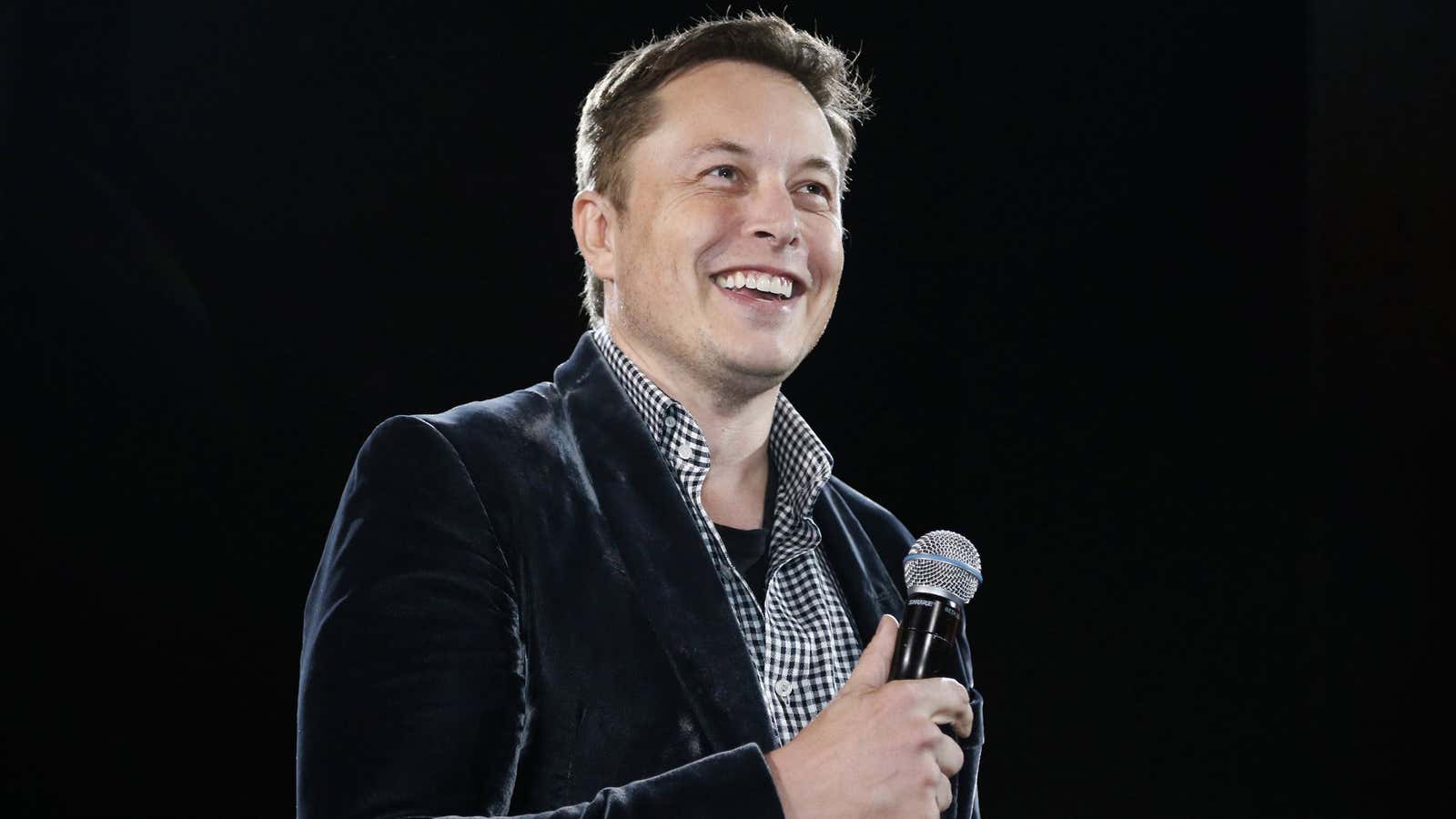This question originally appeared on Quora: How did Elon Musk work for 100 hours a week for more than 15 years? Answer by Patrick Hankinson, founder Hello Focus; Past CEO/Co-Founder of Compilr.
Born in South Africa in 1971, Musk split his time between his home country and his mother’s native country, Canada. He moved to Canada permanently at age 19, when he began his studies at Queen’s University in Ontario. Just a short five years later, he formed his first tech company, Zip2, at age 24. Seeing a good opportunity, he sold that business and moved on to create another that would eventually turn into PayPal. He sold PayPal to eBay and used his profits to start investing in other companies that he thought just might change the world.
So if you’re wondering how you can become as successful as Elon Musk or maybe just how to squeeze in a few more hours out of the day, here’s how Musk does it.
Batching
We all know there are certain things that go well together, like wine and cheese. The same goes for your tasks. If you’re planning to put in 18-hour days, you might as well make the most of your time—Musk does. So while you’re poring over spreadsheets, there’s no reason you can’t be answering emails, especially those that might require you to look up a few figures; you’ve already got the spreadsheets out. The CEO of SpaceX doesn’t even clock out for a half-hour lunch; he combines it with a business meeting and a few emails, of course.
Signal over noise
Tesla doesn’t put their money into advertising. Musk believes in focusing all efforts on perfecting their product, “A lot of companies get confused, they spend money on things that don’t actually make the product better.” The best marketing in the world will have a hard time selling a less-than-desirable product. Besides, as Tesla has proven, there’s no need for a marketing budget when your product sells itself.
Feedback loop
As much fun as it is having people agree with you on everything, it’s counter-productive to perfecting your product or service. Musk keeps his ideas fresh by using trusted advisers to provide consistent and truthful feedback. Fostering an environment of open feedback is important, especially for the long-term health of a product, not to mention it’s the best piece of advice that the 44-year-old billionaire has to offer —“constantly think about how you could be doing things better and questioning yourself.” Though you may not always like what you hear, you and your company will be better off for it.
Prepared employees
When Elon Musk walks into a meeting, he expects that his employees will be ready for anything he throws at them. That demonstrates that in addition to preparation, his staff brings the highest level of talent to his team. Not only does this help to ensure that his employees are some of the brightest who know the complexities of a high-capacity battery cell or a space rocket inside and out, it also saves him time by not waiting for answers that someone should have already known.
Scheduling
This is a common theme of the ultra-productive—a daily schedule that is closely adhered to. And it begins first thing in the morning, not after twenty minutes of “instagramming”. Being the top dog of two major companies doesn’t give Musk a break, it means that a tight schedule is even more imperative. His top aide has his daily planner broken into five-minute slots, and even finding your way into one of those openings is tough work. Logistics can help optimize your schedule. For example, Musk spends Monday in LA with SpaceX, then Tuesday and Wednesday with Tesla up in the Bay Area, and back to LA by Thursday. Friday is split between SpaceX and the Tesla design studio which is directly adjacent to the SpaceX HQ. So not only does he avoid wasting time commuting, he saves hours by bringing the work to him.
Risk taking
There’s a big difference between taking a risk, and taking a calculated risk. Though Elon Musk can tell the two apart, it doesn’t stop him from taking the big ones. For example, when Tesla was on the brink of failure, he poured almost all of his wealth right into the company. Now, after the release of the Model-S, that risk has paid off. Big time. If you’re unsure about whether to take the next big step—schedule it out. Those aren’t just for daily use—create a carefully laid out roadmap to your goal and determine if it’s achievable.
It’s easy for people to say that some folks are just born with the right talents to make them successful entrepreneurs, but that’s not the case. Try following a few of Musk’s examples, and see just how much more productive you can be.
You can follow Quora on Twitter, Facebook, and Google+.
More from Quora:
What is it like to work with Elon Musk?
How does Elon Musk deal with stress?
Is Elon Musk more revolutionary and remarkable than Steve Jobs and Bill Gates?
